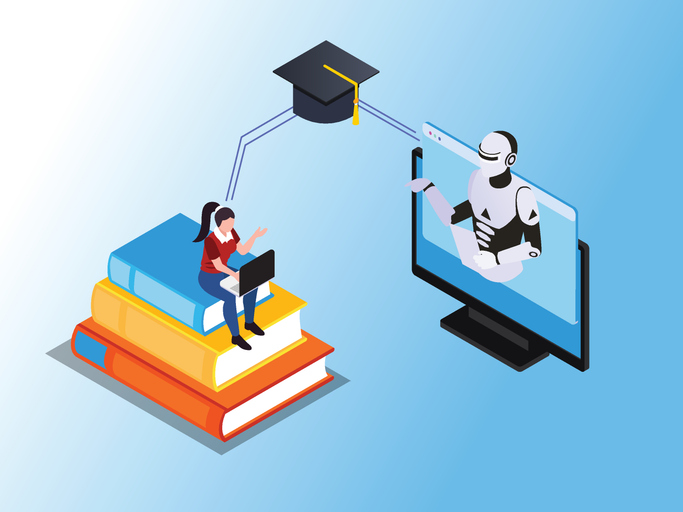For disabled and neurodivergent students, accessing and learning information delivered verbally or visually in the classroom or online can be difficult. As a result, they can struggle to keep up with their peers.
In the UK, if a student declares a disability, their higher education institution has a legal obligation to make reasonable adjustments. Yet, only 34 per cent of disabled students have had support both agreed and completely implemented, according to the recent Disabled Students UK Access Insights Report. Despite their needs being recognised, and the good intentions of staff, the provision of tailored, individualised adjustments can be costly both in time and money.
New ways of teaching and learning that leverage generative artificial intelligence (GenAI) offer an opportunity to move towards inclusive teaching and learning, by generating learning materials adjusted to the individual needs of all learners, not only those with disabilities.
To tap into the potential of personalised learning opportunities, we need to avoid the bottom-up piecemeal application of educational technology, where adoption is often based on the specific preferences of individual staff. Instead, implementation should be guided by a top-down approach that leverages GenAI to meet clear educational goals and learning outcomes in a personalised manner.
For example, the Universal Design for Learning (UDL) framework offers guidance for designing multiple ways of engagement, representation, action and expression. This makes teaching and learning environments more inclusive and supports the embedding of AI-generated personalised learning support, placing the student at the centre of the process.
Remember that learning doesn’t just involve engaging with accessible resources. It’s a complex process involving a range of cognitive and socio-emotional processes such as memory, attention, executive function, metacognition, motivation and self-esteem. Effective learning, especially reflective and critical thinking, does not occur in a vacuum – it occurs in an interactive way, within a complex educational ecosystem.
The increased use of online learning and AI is rapidly changing the traditional nature of this ecosystem, and it is essential that students have the appropriate psychological skill set to enable them to engage successfully with it. Students with disabilities often struggle in online environments – partly because of cognitive constraints that influence their ability to process information, and partly owing to social-emotional constraints such as poor self-esteem, low motivation and anxiety, which can limit their willingness to share ideas and opinions, and affect their acceptance of feedback and challenge.
If GenAI-supported learning is going to help their participation in the wider educational ecosystem, we need to do more than provide the appropriate digital environment – we need to ensure students possess the right psychological resources and skills to enable their learning in this environment.
As highlighted in a recent Campus article, metacognition is important for learning. If confidence and self-efficacy are developed for disabled students through improved opportunities to adapt and engage with learning materials, metacognitive processes can be facilitated too. In the first instance, disabled students must be able to access learning materials in a format that suits them. Then they can begin to develop self-regulatory processes and reap the benefits of improved engagement and increased academic achievement.
Harness personalisation at all levels
Creating an inclusive teaching space using GenAI benefits not only disabled and neurodivergent students, but all students. In fact, the degree of personalisation now available provides the best opportunity to date to place all learners at the centre of their educational journey, both now and in the future.
GenAI supports dynamic multilevel personalisation:
- personalisation based on the psychological profile and preferences of the learner
- personalisation based on their learning environment, course and assessment type
- personalised support for situated learning as it adapts over time to meet the evolving needs of the learner and their assessments.
For example, developments in the areas of multimodal AI can allow students to choose the medium (visual or verbal) they learn in, and also the best format to demonstrate their learning. From a cognitive perspective, students with dyslexia frequently have difficulties with memory and attention and experience cognitive load. This can be addressed by paced study strategies and the chunking and presentation of content in the most appropriate visual or verbal format.
If self-efficacy is low, targeted scaffolding and positive feedback mechanisms would support learning of both low-level (content acquisition) and higher-order tasks (critical thinking, analysis and synthesis) and assist with well-being and engagement.
GenAI can also support learners’ organisational and metacognitive skills by assisting with time management. For example, if a student found assessed presentations particularly challenging, GenAI could allow extra time to prepare, practise and receive feedback.
As technology develops, students can access emotionally intuitive AI resources, which could support the socio-emotional facets of learning and build resilience.
As we negotiate our way through the increasingly complicated educational technology landscape, we can learn a lot from how GenAI can be used to alleviate the challenges faced by students with disabilities, and generalise these benefits to the wider student population. Instead of becoming blinded by technology, remember the ability to offer personalisation, which entails a sharp focus on the learner.
Unlike AI, human learning is subject to a range of psychological constraints. Although AI may help remove many physical barriers to learning, its true potential will only be fully realised when we address psychological barriers and enablers to learning and the skill set required. Using AI to deliver a learner-centric approach will help address these challenges and bring educational benefit for all.
Melody Terras is a senior lecturer in psychology, Graham Scott is a reader in psychology and Naeem Ramzan is professor of AI and computer engineering, all at the University of the West of Scotland. Lynne Beveridge is a KTP associate working with the University of the West of Scotland and HabitatLearn.
If you’d like advice and insight from academics and university staff delivered direct to your inbox each week, sign up for the Campus newsletter.
